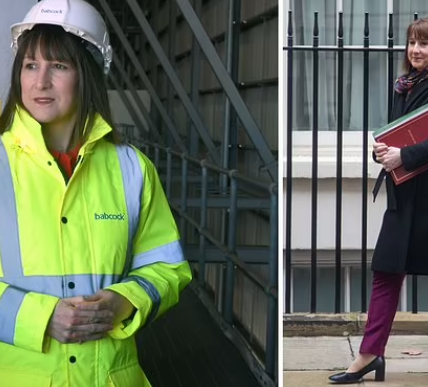DOMINIC LAWSON: Labour’s attack on farmers is part of a cynical plan to cover the country in solar panels and turbines_Nhy
Fashionable as it is to presume that Labour’s attack on farmers is just class war against wicked landowners (even those who work all hours to provide food for the nation), there is a different purpose behind it.
Sir Keir Starmer actually believes in Ed Miliband’s impossible scheme to make the UK’s national grid free of all fossil fuels by 2030 – which means a madcap rush to develop solar power.
Almost 150 solar ‘farms’ are now in development, but Miliband wants countless more, to make the UK – in the slogan repeated endlessly by him, Starmer and Steve Reed, the Secretary of State responsible for agriculture – ‘a clean energy superpower’.
In this context, farming is, well, dirty.
That also explains why, in a Budget measure less noticed than Rachel Reeves’ proposal to end the inheritance tax exemption on farms worth more than £1 million, the Chancellor said she would push ahead with the imposition of a ‘carbon tax’ on, among other products, fertiliser from 2027.
Reeves is doing so at a speed not matched in the EU, thereby putting our farmers at a disadvantage.

Sir Keir Starmer actually believes in Ed Miliband’s (pictured in February) impossible scheme to make the UK’s national grid free of all fossil fuels by 2030

Almost 150 solar ‘farms’ are now in development, but Miliband wants countless more (pictured: Wind turbines in Scotland)
David Walston, the owner of Thriplow Farm near Cambridge, warned: ‘That means we’ll produce less food. We’re not going to eat less food – so we are just going to import it from a country that doesn’t tax fertiliser.’
So, another reason for landowners, however reluctantly, to turn their fields over to ‘renewable energy’. Obviously, some will welcome the profits they can make thereby, even if there is none of the pride or passion that comes from farming food rather than kilowatts.
The Countryside Alliance, even before the Election, warned that ‘tenant farmers have been threatened with eviction so that land can be used for solar’. Labour, in this sense, are on the side of the most avaricious landowners, and against tenant farmers.
The President of the Countryside Alliance is actually a Labour peer, Baroness (Ann) Mallalieu. Last week she furiously declared: ‘Before the Election, Steve Reed went all round the farming organisations telling them changes like this on inheritance weren’t even in contemplation. He said it was nonsense, and gave us an assurance.’
Starmer himself addressed the 2023 National Farmers’ Union conference and told them he understood: ‘Losing a farm is not like losing any other business. It can’t come back.’
Yes, those solar ‘farms’ are not going to be temporary, especially with the profitability guaranteed under the terms Labour are gifting them (paid by us in our energy bills, of course).
It is a grotesquely extravagant use of land for power generation, and not just because it produces no energy at all when the sun doesn’t shine (in which respect, the exchange of food security for claimed energy security is not an equation in the nation’s favour).

Keir Starmer himself addressed the 2023 National Farmers’ Union conference and told them he understood: ‘Losing a farm is not like losing any other business. It can’t come back.’
As the Conservative MP Greg Smith pointed out in a Commons debate on this issue last month: ‘We need 2,000 acres of solar panels to produce enough power for 50,000 homes: for a small modular [nuclear] reactor, we need the space of two football pitches and it will produce enough power for a million homes.’
But Ed Miliband is doing nothing to speed up that carbon-free technology, because it’s not ‘renewable’.
As I say, this transfer from land-for-food to land-for-kilowatts is strategic, not coincidental. This – and the implications for landowners’ tax-planning – was spotted by the legal firm Pinsent Masons in its post-Budget commentary.
It sent a note to clients: ‘Historically, farmers have been reluctant to grant leases for renewable development, because the land is deemed to transfer out of agricultural holding, and as such will lose out on inheritance tax relief.
‘However, following the changes announced in the Budget, landowners will now be much more incentivised to look at leasing land to renewable developers as a way of funding new income streams to top up the loss.
‘It may also trigger more sales of farmland, meaning more land becomes available for different uses.’
This, too, would fit in with the Labour Government’s strategic objective, as it wants to accelerate the building of homes in the countryside (not, in itself, an ignoble purpose).
Blighted
But what makes our countryside attractive is blighted by the indiscriminate spread of solar farms (which explains why Ed Miliband is enforcing their development against the wishes of local populations and councils).
As Jacqueline Wright told the Sunday Times last year after a solar farm was built next to her family’s ‘dream home’ in rural Worcestershire: ‘It was all green fields, cattle and crops. Now, it’s all solar panels – a sea of grey.’
I know farms are not necessarily things of beauty – they are themselves about production, not sightseeing.
But the idea of turning vast tracts of what we still term, nostalgically, our green and pleasant land into electrically humming vistas of grey and black: well, it’s not what most people would think of as ‘saving our environment’.
Yet that is the Labour Government’s claimed reason for advocating this transformation of the landscape.
Shame about the farmers, though, who cannot quite believe how they were taken in by Keir Starmer’s promises.
Don’t use pets in assisted dying debate
Esther Rantzen and Kim Leadbeater (the proposer of the ‘assisted dying Bill’) constantly argue that they only want for humans what we already do for ‘our pets’.
This has always struck me as a sinister analogy, since our pets are not consulted about their termination. And the inquest into the suicide of a vet last week revealed something more.
Dr John Ellis had been deeply distressed by the way he had been ‘destroying’ animals at the request of their owners, who said they could not afford the treatment he believed was in the creatures’ best interests. Vets have long had a term for this: convenience euthanasia.
A report from Sainsbury’s Finance revealed that over half of vets had put down a dog or cat in the previous five years because the ‘owners couldn’t afford to treat them’.

The Private Members’ Bill has been proposed by Labour MP Kim Leadbeater (pictured)
You would have to be very naive not to see a connection between this and the pressures on families over the colossally expensive care home fees for the infirm elderly, should ‘assisted dying’ become law.
Do we really think that relatives would not subtly suggest a certain option to grannie, or that she would not feel under moral pressure to take the cheaper pathway of a rapid exit?
As Barbara Rich puts it: ‘Those who are captivated by sentimental comparisons with animals have not even begun to recognise the existence of these problems, let alone propose answers to them.’
By the way, Ms Rich is a leading barrister in the field of wills and inheritance. MPs should heed her warning.



